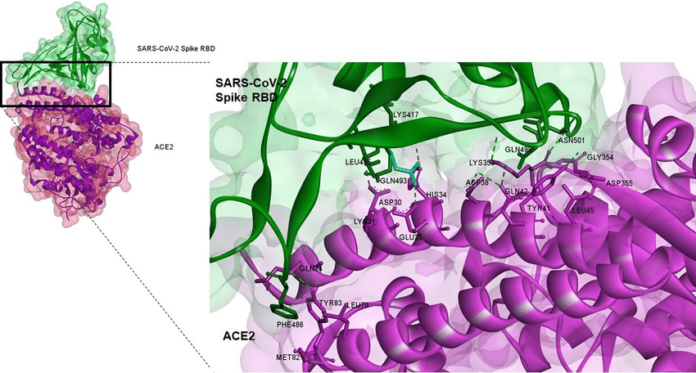A study by Ozioko et al. (2024) titled “Druggability and molecular docking of essential secondary metabolites from Azadirachta indica leaf against angiotensin converting enzyme-2: Covid-19 in focus‘ published in African Journal of Pharmaceutical Research and Development reveals that Azadirachta indica compounds strongly inhibit ACE2, showing high druggability and potential as natural therapeutics for Covid-19 based on in-silico analysis.
“
Azadirachta indica (neem) compounds strongly inhibit ACE2, showing high druggability and potential as natural therapeutic agents for Covid-19 based on in-silico analysis. – Ozioko et al. 2024
The study explores the potential use of compounds derived from the leaves of Azadirachta indica, also known as neem, as inhibitors of the enzyme ACE2 (angiotensin converting enzyme-2). This enzyme is crucial in the infection process of the SARS-CoV-2 virus, which causes Covid-19. By analyzing the druggability and performing molecular docking studies on these metabolites, the researchers aim to identify effective compounds that can potentially prevent the virus from binding to the ACE2 enzyme, thereby hindering the infection process. This research contributes to the ongoing efforts to find novel therapeutic agents for the treatment and prevention of Covid-19.
How the Study was Conducted
The authors began by conducting a literature survey and mining databases, such as the National Center for Biotechnology Information (NCBI), to identify known compounds from Azadirachta indica (neem) and FDA-approved drugs for Covid-19. From the literature and database mining, 12 secondary metabolites from Azadirachta indica and 5 FDA-approved drugs were selected for further analysis. The druggability of these compounds was assessed using tools like SwissADME and ADMETlab to predict their drug-like properties and potential as therapeutic agents. The authors performed molecular docking experiments using tools such as Autodock Vina and UCSF Chimera to simulate how these compounds interact with the ACE2 enzyme. The docking results were visualized and analyzed using Discovery Studio to identify the best candidates based on their binding affinities. The study identified several compounds from Azadirachta indica, such as desacetylnimbin, azadiradione, nimbin, nimbolide, nimbinene, and azadirone, as potent inhibitors of ACE2 with high druggability potentials. These compounds showed the lowest free energy (binding score) and were considered valuable natural bioactive compounds for targeting ACE21.
What the Authors Found
The authors found that several compounds from Azadirachta indica, such as desacetylnimbin, azadiradione, nimbin, nimbolide, nimbinene, and azadirone, were identified as potent inhibitors of the ACE2 enzyme. These compounds showed the lowest free energy (binding score), indicating strong binding affinity and potential effectiveness in preventing the SARS-CoV-2 virus from binding to ACE2. The identified compounds exhibited high druggability potentials based on in-silico analysis using tools like SwissADME and ADMETlab. This suggests that these natural bioactive compounds have favorable properties for drug development. The study compared these compounds with FDA-approved drugs for Covid-19 and found that the selected neem metabolites showed promising results, potentially offering new therapeutic options for treating Covid-19.
Why is this important
Covid-19 Treatment: Identifying effective compounds against ACE2 is crucial in the fight against Covid-19. ACE2 serves as the entry point for the SARS-CoV-2 virus into human cells, so finding inhibitors can potentially prevent or reduce the infection.
Natural Compounds: The study focuses on secondary metabolites from Azadirachta indica (neem), a plant with a long history of medicinal use. Using natural bioactive compounds can offer safer and more affordable therapeutic options compared to synthetic drugs.
Drug Discovery: The research contributes to drug discovery by identifying new potential therapeutic agents. This can lead to the development of novel treatments not only for Covid-19 but also for other diseases where ACE2 plays a role.
Public Health: Effective treatments for Covid-19 can help control the spread of the virus, reduce the burden on healthcare systems, and save lives. This study adds to the pool of potential treatment options, enhancing our ability to combat the pandemic.
Scientific Advancement: The methodology used in this study, combining literature survey, in-silico analysis, and molecular docking, showcases an effective approach for identifying drug candidates. This can be applied to other studies, advancing the field of drug discovery and development.
What the Authors Recommended
The authors recommend further experimental validation and development of the identified compounds from Azadirachta indica (neem) as potential therapeutic agents for Covid-19. Specifically, they suggest:
In-vitro and In-vivo Studies: Conducting in-vitro (test tube or cell culture) and in-vivo (animal) studies to confirm the efficacy and safety of the identified compounds, such as desacetylnimbin, azadiradione, nimbin, nimbolide, nimbinene, and azadirone.
- Clinical Trials: If the in-vitro and in-vivo studies are successful, proceed with clinical trials to evaluate the compounds’ effectiveness and safety in humans.
- Collaboration: Encouraging collaboration between researchers, pharmaceutical companies, and healthcare professionals to expedite the development and testing of these potential therapeutic agents.
- Further Research: Continuing research to explore other bioactive compounds from Azadirachta indica and other medicinal plants for potential therapeutic applications against Covid-19 and other diseases.
This study highlights the promising potential of Azadirachta indica (neem) compounds as natural inhibitors of the ACE2 enzyme, a critical target in the fight against Covid-19. Through in-silico analysis and molecular docking, several bioactive metabolites demonstrated strong binding affinity and high druggability, positioning them as viable candidates for further research. While these findings are encouraging, the authors emphasize the need for in-vitro and in-vivo validation, followed by clinical trials, to confirm their efficacy and safety. With continued research and collaboration, neem-derived compounds could pave the way for novel, affordable, and effective therapeutic options for Covid-19 and related diseases, contributing to global public health efforts.
















 The African Research (AR) Index is a comprehensive scholarly directory and database focused explicitly on journal publishers that publish and disseminate African research.
The African Research (AR) Index is a comprehensive scholarly directory and database focused explicitly on journal publishers that publish and disseminate African research.

